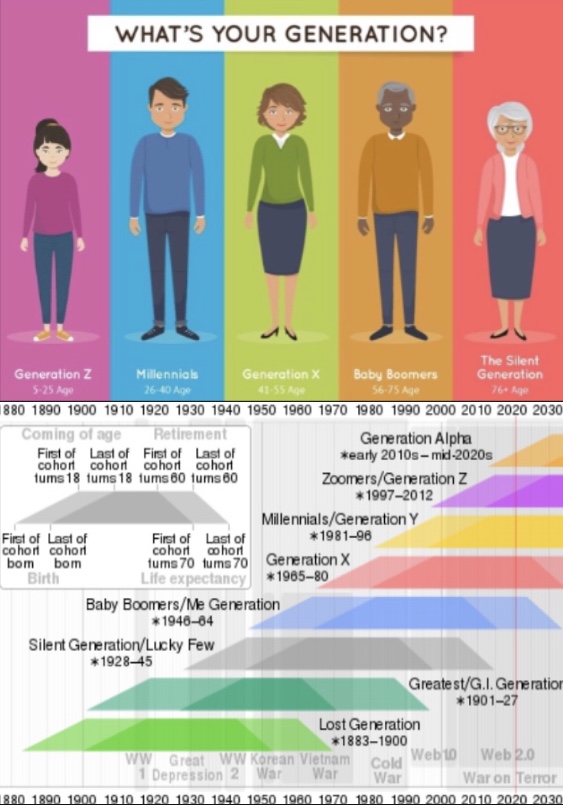What Legacy Will Each Generation Leave Behind?
March 26, 2021
Nowadays, generational divides seem more defined than ever, with each generation very distinct and different than the last one. There are six generations that currently have a significant number of people that are still alive, which are, The Silent Generation, The Baby Boomers, Gen-X, The Millennials, Gen-Z, and the newest generation, Gen-Alpha. One must ask the question, why are there generational differences in the first place, and why are they so distinct from one another? In this article, I will attempt to analyze the differences between the generations, what led to each generation acting the way they do, and what kind of legacy will they will likely leave behind?
The Silent Generation (born 1928-1945):
The Silent Generation is currently the oldest generation with a significant population still living. They are called “The Silent Generation” because they were raised in a very traditionalist time, under the mindset of “speak only when spoken to”. Times for the silent generation were largely really tough, with their parents being members of The Lost Generation and The Greatest Generation, who experienced among the most difficult times in recent memory. People in the silent generation grew up as children experiencing the Great Depression, World War II, and racial segregation all during their younger years. They are more reserved and more conservative than other generations not only because of their parents, but because they understand more than anyone else alive that life is not sunshine and rainbows, and that it can often be tragic and depressing. They don’t expect much out of life, and they appreciate what they have far more than what they could have, hence their more traditionalist attitudes towards life. Respect these elders, as they went through a lot and are the last remnants of a world that no longer exists, and are an excellent source of insight and wisdom.
The Baby Boomers (born 1946-1964):
Easily the most controversial generation alive, the legacy of the baby boomers is hotly contested. They are named the baby boomers because of the massive spike in births after the depression and the war ended. Many boomers grew up during better times than previous generations, with much of the hardship of previous times getting better, the boomers were the first generation where simple things like getting by, simply were not enough, and demanded more out of their lives. During this time, the boomers were still living in a very socially conservative country with strict social rules. Many boomers did not like the restrictions that their parents placed on them and didn’t see the point in doing them, and became an activist and extremely liberal generation during their younger years, ushering in the sexual revolution, and normalizing things such as divorce, pornography, and premarital sexual relationships in modern American life, all of which have had disastrous consequences on society and generations afterwards. I don’t want to come off as being too harsh towards the boomers, they did plenty of great things as well, such as fighting for civil rights in the 60’s and pioneering massive technological advances, which should not be ignored. Despite this, boomers nowadays are seen as the ultra conservative generation, and called “backwards” and “dismissive”. Jill Filipovic, activist writer of the Millennial generation writes, “Millennials make up close to a quarter of the U.S. population, but hold just 3% of the wealth. When boomers were our age, they made up 21%… Every generation looks at the young and chafes at the idea they are doing things differently. Every generation has a particular type of amnesia and forgets that, they too, were once the kids-doing-it-wrong”.
The legacy of the boomers remains complicated, but their actions when they were younger have easily impacted our modern society the most of any currently living generation. In my opinion, the boomers dropped the ball in many key areas that are going to be extremely hard to reverse, but they had plenty of triumphs as well, and those should be respected. Plus, most of the boomers I come across are very nice and friendly people that I enjoy talking with, and are deserving of courtesy.
Gen-X (born 1965-1980):
Sandwiched in between two extremely controversial generations, Gen-X often gets overlooked and forgotten about. They were born and raised in a period of high political tension both at home and overseas, and an economic downturn occurring. Gen-X at the time was also the first generation that had a lower life expectancy than the one before it, likely due to substance abuse, which was widely introduced in the 60’s during the time of the boomers’ youth. They’re largely cynical folks, who like the Silent Generation, don’t expect much out of life, and their values reflect that. Instead, valuing what they currently have, seeking the best “bang for their buck”. Their generation helped facilitate the rise of consumerism, valuing material items and accumulating wealth more than previous generations, perhaps a byproduct of growing up during the rivalry between the United States and the Soviet Union, once it was clear the United States and the capitalist system won over communism. Of course, this is a big change that Gen-X made, but unfortunately gets overlooked. So while Gen-X is far from flashy, they’re dependable and pragmatic in their outlook on life usually, and more economically minded than other generations.
The Millennials (born 1981-1997):
The other extremely controversial generation, the millennial generation is one that receives a lot of hate, especially from older types. They are well known for their liberal outlook on life, emphasizing the importance political correctness and a non judgmental approach to life. None of that sounds too horrible, but millennials can be very aggressive when enforcing their beliefs, sometimes being overly rude and aggressive towards those who think differently. In this way, millennials can stoop to the level of becoming what they wish to destroy. The contradiction angers a lot of people, as do their progressive disregard of traditions and institutions before them, leading to the claims of being “entitled” or “pretentious”. My grandmother, Pat Davis, part of the boomer generation says, “In the good old days, schools didn’t teach us such entitlement, now they think everything is entitled to them. When we were growing up, we didn’t have that, we were taught we had to work. And it’s a shame, and I feel bad for them, but I think it comes down to how people were raised. But I don’t want to generalize, there are older people who want the government to do things for them, and hard working young people, but I think older generations view the younger ones as selfish”.
I believe we are seeing the results of the millennial’s contributions to society currently, with more socially liberal beliefs being accepted, but political tension increasing as well. Objectively, things are getting better for a lot of people, with technology advancing and more people getting higher education. yet nobody really feels as if they are because of the decaying bonds between families. It’s more than warranted I think to complain about the attitudes of millennials, but older generations miss the similarities between the millennials and themselves in their youth. In this sense, one could say the millennials are merely the next logical step of what boomers ushered in.

Gen-Z (born 1998-2010):
Gen-Z is the next generation after millennials and the next generation to leave their impact on the world, with many now getting ready to go to college and go into job markets. As a member of Gen-Z myself, I can say with much confidence that our generation will either be the best in a very long time, or one of the worst, without much room in between. Gen-Z is a very extreme generation in general, with some acting like millennials, but with a significant number of cynical social conservatives as well, as well as being the first generation in a very long time to be more conservative than the previous one at the same time. For example, according to a survey by The Guild, 59% of Gen-Z members report either being “moderate or conservative” on social issues compared to 85% of Gen-X and 83% of millennials saying they are “quite” or “very” liberal on those same issues at the same time. One thing that many “zoomers” have in common however is that they largely do not share the values of being “woke” that the millennials do, but instead opting to be “based”, which is Gen-Z slang for stating your opinion on a controversial topic in a blunt and unforgiving manner. The reason for this sharp turn I believe is because of our media having sensational headlines, being shocking in order to get clicks and draw attention to themselves, as well as a visceral reaction to the antics of millennial activists on college campuses and online. Sensational video titles such as “Angry feminist gets DESTROYED with FACTS and LOGIC” on YouTube are greatly appealing to members of Gen-Z, who have grown up with social media their whole lives. Gen-Z has not yet made it’s mark, but I believe our biggest contribution will be a sharp turn away from political correctness on both the left and right side of the aisle, which could either help society step out of their bubbles, or send it spiraling by making our society crueler and less empathetic towards each other.
Gen-Alpha (born 2011-2025):
Being the youngest generation, not much is known about Gen-Alpha, as the oldest member would only be 10 years old at most. Their legacy is yet to be determined. If one had to guess, I would guess that they will act somewhat similar to millennials, with similar activist tendencies and will serve as a counter reaction to Gen Z’s societal contributions, but it’s very difficult to tell.
In conclusion, I think generations are molded from childhood, and then put their ideals based on those experiences into the forefront at a young age around 25-35 years old. Generations are growing further apart because the world is changing so quickly, but before, the world changed much slower, without all of the technology and globalization that we have now. I think that generational divides can improve if each generation were to look at the previous generations’ successes and repeat them, but examine their failures as well and work to fix them. Younger generations shouldn’t blame all their problems on the older ones, and older generations shouldn’t get as mad at younger ones because of changing times, and should aim to be mentors to them, because eventually they will have to be the one to protect and uphold civilization. In other words, attempt to listen and learn from one another, and understand why differences in attitudes vary from different cohorts of people, and I think we would have a much less polarizing world.


